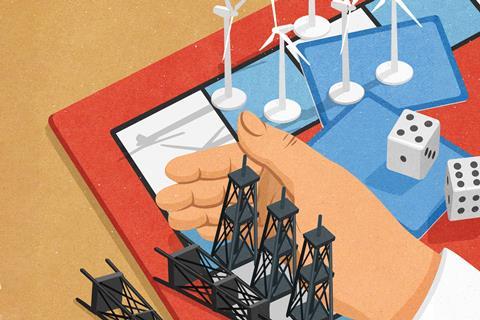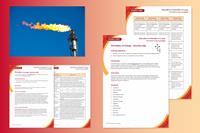Recent steep increases in oil and gas prices could push us towards renewable energy

On 24 February 2022, while we watched in shock as Russia invaded Ukraine, we may not have expected the skyrocketing fossil fuel prices that followed. That day, the price of natural gas rose by more than half in Europe. Crude oil prices rose above $100 per barrel for the first time since 2014.
That was ‘a sudden wake-up call,’ showing how important it is to spend money on setting up renewable energy generation, says Doug Stewart, founder and CEO of Green Energy UK based in Ware. That may not be surprising, because Green Energy UK claims to be the UK’s only supplier of 100% green gas and renewable electricity. Doug also suggests that countries should think about where they get their energy. ‘Should we be making some moral judgments about where we buy our energy from?’ he asks.
The war in Ukraine brought this question into focus because in 2019 the EU got 43% of its gas and over a quarter of its oil from Russia. Many countries have now imposed sanctions on Russia as financial penalties for invading Ukraine. The US and UK quickly banned Russian oil and gas imports. EU countries want to do the same, but it will be harder and slower for them.
That was ‘a sudden wake-up call,’ showing how important it is to spend money on setting up renewable energy generation, says Doug Stewart, founder and CEO of Green Energy UK based in Ware. That may not be surprising, because Green Energy UK claims to be the UK’s only supplier of 100% green gas and renewable electricity. Doug also suggests that countries should think about where they get their energy. ‘Should we be making some moral judgments about where we buy our energy from?’ he asks.
The war in Ukraine brought this question into focus because in 2019 Europe got 44% of its gas and over a quarter of its oil from Russia. Many countries have now imposed sanctions on Russia as financial penalties for invading Ukraine. The US and UK quickly banned Russian oil and gas imports. European countries want to do the same, but it will be harder and slower for them.
The resulting energy price crisis comes with a need to change our energy strategy to prevent further environmental problems. The solution to both could be the same: renewable green energy, harvested from the wind, sun, water and earth – and even ‘green gas’ sourced from farm, food and landfill waste. Although current high prices are hard for many, they might push us towards a cheaper, cleaner, less problematic energy supply.
In your class
Reading high-quality, subject-specific texts is vital for students. Not only does it provide good comprehension practice, but important global issues can also be highlighted. Use the downloadable structure strips to help your 14–16 learners write extended responses about fossil fuels and the atmosphere after reading the text and discussing any challenging language as a class.
Fossil fuels come from the fossilised remains of plants and animals that died millions of years ago. Many of us heat our homes and cook our food using natural gas. This is a mixture of small carbon-based molecules, mostly methane, with smaller amounts of other gases, the most common being ethane, propane and butane. We rely on natural gas so much because its cost per unit of energy is just a quarter of that of the electricity we use. That is still true even with recent gas price increases.
Meanwhile, most vehicles still run on products found in crude oil. Crude oil is a much more complex mixture of hydrocarbons than natural gas, potentially containing thousands of different compounds. Chemical companies use fractional distillation to separate crude oil into smaller, more useful parts. The process separates fractions based on their different molecular weights and boiling points. Large molecules stay at the bottom of the fractionating column where it is hottest, going into products like heavy fuel oil. Moving upwards, fractions move from diesel, to kerosene, to petrol, each containing progressively smaller molecules with lower boiling points.
Some power plants use heavy fuel oil to produce electricity. Burning the molecules releases the energy they have held for millions of years. Burning diesel, kerosene and petrol powers vehicles by releasing energy in the same way.
From crisis to opportunity
However, burning fossil fuels also produces water vapour and carbon dioxide. Carbon dioxide is a greenhouse gas that acts as an insulating blanket in the Earth’s atmosphere. It retains energy that the Earth has absorbed from the Sun and then emitted again as infrared radiation. This warms the planet and is leading to dangerous climate change.
-

Download this
Structure strips, for age range 14–16
Learners will improve their writing skills by using the side-by-side prompts and revisit prior knowledge of topics within a new context.
Download the student worksheet as MS Word or PDF, the article text as MS Word or PDF and the teacher notes as MS Word or PDF.
Download this
Structure strips, for age range 14–16
Learners will improve their writing skills by using the side-by-side prompts and revisit prior knowledge of topics within a new context.
Download the student sheet and teacher notes from the Education in Chemistry website: rsc.li/3x15m4H
In 2020, the UK and Ireland used 1.3 million barrels of oil per day. In the same year, they consumed a total of 77.8 billion cubic metres of natural gas, accounting for around one fiftieth of the world’s total consumption. Natural gas usage almost doubled between 1990 and 2004, as electricity plants switched from coal to gas to reduce their carbon dioxide emissions.
According to the UK government, only 3% of the country’s gas is supplied by Russia. ‘That’s not really a major drama to us,’ Doug says. About half comes from the North Sea, with another large chunk coming from Norway. Despite this minimal direct reliance, sanctions against Russia dramatically increased oil and gas prices. Doug explains that this is because fossil fuels are traded internationally, so prices go up around the world at the same time.
In 2020, the UK and Ireland used 1.3 million barrels of oil per day. In the same year, they consumed a total of 77.8 billion cubic metres of natural gas, accounting for around one fiftieth of the world’s total consumption. Natural gas usage almost doubled between 1990 and 2004, as electricity plants switched from coal to gas to reduce their carbon dioxide emissions.
According to the UK government, only 3% of the country’s gas is supplied by Russia. ‘That’s not really a major drama to us,’ Doug says. About half comes from the North Sea, with another large chunk coming from Norway. Despite this minimal direct reliance, sanctions against Russia dramatically increased oil and gas prices. Doug explains that this is because fossil fuels are traded internationally, so prices go up around the world at the same time.
It isn’t just international war that’s to blame though. Problems had already been mounting in the UK for months. ‘The energy crisis in September 2021 was caused by a perfect storm in the final quarter of last year,’ Doug says. The winter was very cold, he notes, with little wind to generate electricity via turbines. Meanwhile, economies were consuming more electricity to try to recover from the pandemic. In addition, the UK government had closed its large gas storage facility. Previously this provided the option to buy more gas when prices were lower and use it when they increased. These factors all increase the pressure to develop alternatives.
On 7 June 2017, for the first time ever, the UK generated more electricity from renewable sources than fossil fuels
Sanctions on Russia could have long-term positive effects, too. Now is the time for Europe to fast-track its move to renewable energy sources, says Simon Evans, deputy editor of Carbon Brief. ‘In Europe, responses so far suggest the invasion will be a catalyst for the clean energy transition, even though it may lead to short-term increases in coal use, for example,’ Simon explains.
Sanctions on Russia could have long-term positive effects, too. Now is the time for Europe to fast-track its move to renewable energy sources, says Simon Evans, deputy editor of Carbon Brief. ‘In Europe, responses so far suggest the invasion will be a catalyst for the clean energy transition, even though it may lead to short-term increases in coal use, for example,’ Simon explains.

Creating renewable energy infrastructure only leads to small amounts of greenhouse gas emissions. They then generate many times more electricity than is used in their manufacture without any emissions, with a minimal contribution to the greenhouse effect. Recognition of the climate change threat has seen countries increasingly adopt such clean energy sources. For example, on 7 June 2017, for the first time ever, the UK generated more electricity from renewable sources than fossil fuels.
The UK and Ireland have both made promises for their greenhouse gas emissions to reach net zero by 2050. This means that any emissions will be balanced out by efforts to remove greenhouse gases already in the atmosphere. As such, electricity will have to come from renewable, carbon-neutral sources, instead of from oil and gas. UK renewable electricity generation has doubled since 2014. It currently stands at nearly half of overall output, so there is still a way to go.
The UK and Ireland have both made promises for their greenhouse gas emissions to reach net zero by 2050. This means that any emissions will be balanced out by efforts to remove greenhouse gases already in the atmosphere. As such, electricity will have to come from renewable, carbon-neutral sources, instead of from oil and gas. UK renewable electricity generation has doubled since 2014. It currently stands at nearly half of overall output, so there is still a way to go.
Realistic solutions
Conventional power plants and four of the five leading renewable energy options all rely on turning turbines to produce electricity. Burning fossil fuels heats water or steam, which drives turbines. Generators can do the same by burning biomass, plants that have recently pulled carbon dioxide from the air through photosynthesis. Geothermal energy heats the water or steam needed for the turbines using heat from beneath the Earth’s surface. Wind and hydroelectric power both directly harness renewable kinetic energy from the environment to turn turbines. Some forms of solar power also heat water to drive turbines, but more commonly they use silicon photovoltaic (PV) panels to directly convert sunlight to electricity.
Simon explains that renewable sites can be built quickly – in months for solar farms and perhaps a year for wind turbines built on land. This has helped the UK build over 11,000 wind turbines, fulfilling around a quarter of the nation’s electricity needs. ‘For renewables in the UK specifically, there are enough onshore wind and solar projects with planning permission to offset more than the gas we currently import from Russia,’ he stresses. ‘In the medium- to long-term, renewables are a key part of reducing reliance on gas power.’
Simon explains that renewable sites can be built quickly – in months for solar farms and perhaps a year for wind turbines built on land. This has helped the UK build over 11,000 wind turbines, fulfilling around a quarter of the nation’s electricity needs. ‘For renewables in the UK specifically, there are enough onshore wind and solar projects with planning permission to offset more than the gas we currently import from Russia,’ he stresses. ‘In the medium- to long-term, renewables are a key part of reducing reliance on gas power.’
The greenest energy in the world is the stuff you don’t use. We waste a terrifying amount as 21st-century consumers
Renewable energy sites have also become cheaper than fossil fuel electricity generation plants. In the last decade, renewable costs have plummeted, with onshore wind and solar power now the cheapest forms of energy. The International Energy Agency has therefore predicted that there will be a record-breaking increase in global solar energy production every year after 2020. This forecast got off to a good start by coming true in 2021. But there is a delay in switching completely because electricity companies have already paid to build existing fossil fuel plants and want to make their money back before turning them off.
Renewable energy sites have also become cheaper than fossil fuel electricity generation plants. In the last decade, renewable costs have plummeted, with onshore wind and solar power now the cheapest forms of energy. The International Energy Agency has therefore predicted that there will be a record-breaking increase in global solar energy production every year after 2020. This forecast got off to a good start by coming true in 2021. But there is a delay in switching completely because electricity companies have already paid to build existing fossil fuel plants and want to make their money back before turning them off.
It’s still more expensive to cook and heat homes with electricity than gas, too. That’s why Doug and his colleagues at Green Energy UK produce methane from biological sources. Microbes turn farm, food and landfill waste into ‘green gas’ in closed containers called digesters, without air. For this reason, the process is sometimes called anaerobic digestion. Green Energy UK puts the gas into the same national grid that fossil-based natural gas flows through. While not much demand can be met using green gas, it is cleaner and less problematic than buying from countries like Russia.
Such renewable energy technologies could solve many of the current energy problems, yet few of us are involved in putting them in place. If that feels frustrating, there are some things we can each do to make a difference. For example, we can change our behaviour and the way we use energy.
The best way to cut our reliance on expensive fossil fuels is simply to reduce the amount of energy we use. Simon recommends turning down thermostats, working from home more, riding on public transport, walking more and driving slower. UK-based low carbon energy consultants Element Energy found that if everyone in the UK decreased their room temperature by just one degree Celsius, we would prevent 1.18 million tonnes of carbon dioxide emissions annually.
The best way to cut our reliance on expensive fossil fuels is simply to reduce the amount of energy we use. Simon recommends turning down thermostats, working from home more, riding on public transport, walking more and driving slower. UK-based low carbon energy consultants Element Energy found that if everyone in the UK decreased their room temperature by just one degree Celsius, we would prevent 1.18 million tonnes of carbon dioxide emissions annually.
‘The greenest energy in the world is the stuff you don’t use,’ agrees Doug. ‘We waste a terrifying amount as 21st-century consumers.’
More resources
- Show your learners an example long-form answer and get some top tips with Modelling answers to GCSE six-mark questions.
- Link your lessons on renewable energy to the UN’s Sustainable development goal 7 while debating Fossil fuels and global carbon emissions.
- Use the differentiated, editable Crude oil worksheets to provide your 14–16 learners with a range of assessment questions.
- Meet Xameerah, a senior committee specialist in the UK government, who provides specialist scientific advice to inform policies.
This article was updated 28 June 2022 to correct a figure for UK and Ireland oil consumption.
More resources
- Show your learners an example long-form answer and get some top tips with Modelling answers to GCSE six-mark questions: rsc.li/38Zne6X
- Link your lessons on renewable energy to the UN’s Sustainable development goal 7 while debating Fossil fuels and global carbon emissions: rsc.li/3a6AwyI
- Use the differentiated, editable Crude oil worksheets to provide your 14–16 learners with a range of assessment questions: rsc.li/3z5DjCP
- Meet Xameerah, a senior committee specialist in the UK government, who provides specialist scientific advice to inform policies: rsc.li/3t5OHe3
Article by Andy Extance, a freelance science writer, and Abigail Pinchbeck who works in science journal editing. Resource by Kristy Turner, a school teacher fellow at University of Manchester/Bolton School
















No comments yet